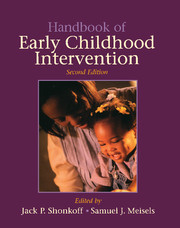Book contents
- Frontmatter
- Contents
- Foreword
- Preface
- Contributors
- PART ONE INTRODUCTION
- PART TWO CONCEPTS OF DEVELOPMENTAL VULNERABILITY AND RESILIENCE
- 2 The Biology of Developmental Vulnerability
- 3 Adaptive and Maladaptive Parenting: Perspectives on Risk and Protective Factors
- 4 The Human Ecology of Early Risk
- 5 Cultural Differences as Sources of Developmental Vulnerabilities and Resources
- 6 Protective Factors and Individual Resilience
- PART THREE THEORETICAL FRAMEWORKS FOR INTERVENTION
- PART FOUR APPROACHES TO ASSESSMENT
- PART FIVE SERVICE DELIVERY MODELS AND SYSTEMS
- PART SIX MEASURING THE IMPACT OF SERVICE DELIVERY
- PART SEVEN NEW DIRECTIONS FOR THE TWENTY-FIRST CENTURY
- Name Index
- Subject Index
3 - Adaptive and Maladaptive Parenting: Perspectives on Risk and Protective Factors
Published online by Cambridge University Press: 05 November 2011
- Frontmatter
- Contents
- Foreword
- Preface
- Contributors
- PART ONE INTRODUCTION
- PART TWO CONCEPTS OF DEVELOPMENTAL VULNERABILITY AND RESILIENCE
- 2 The Biology of Developmental Vulnerability
- 3 Adaptive and Maladaptive Parenting: Perspectives on Risk and Protective Factors
- 4 The Human Ecology of Early Risk
- 5 Cultural Differences as Sources of Developmental Vulnerabilities and Resources
- 6 Protective Factors and Individual Resilience
- PART THREE THEORETICAL FRAMEWORKS FOR INTERVENTION
- PART FOUR APPROACHES TO ASSESSMENT
- PART FIVE SERVICE DELIVERY MODELS AND SYSTEMS
- PART SIX MEASURING THE IMPACT OF SERVICE DELIVERY
- PART SEVEN NEW DIRECTIONS FOR THE TWENTY-FIRST CENTURY
- Name Index
- Subject Index
Summary
Professionals who think about parenting often focus on the many social ailments that burden families, including the effects of single parenting, the problem of teenage pregnancies, the increasing number of children being raised in violent environments, the negative effects of substance abuse, and the impact of these factors on the psychological well-being of children and families. Less frequently, discussions center around the adaptive aspects of parenting or the conditions under which children raised with problematic or maladaptive parenting prove to be resilient.
In considering adaptive and maladaptive parenting, it is important that the latter not be viewed as a permanent state for families but be recognized as a situation that can be altered, given improved circumstances. This leads to two critically important questions: 1) What circumstances foster adaptive parenting? and 2) Which circumstances lead to resilience in situations of risk? We argue that parents who have positive relationships with multiple systems that provide organization and support in their environments exhibit more adaptive parenting styles than those who lack these significant relationships. Positive relationships and communication between the parent and child, and between the parents and members of their support network, have all been shown to be beneficial in fostering adaptive parenting. Some parents, even when living under conditions of high psychosocial risk, who are able to maintain positive reciprocal relationships, adequate support networks, and have the added benefit of sharing parenting with someone else, can alter their behaviors and engage in enhanced caregiving.
- Type
- Chapter
- Information
- Handbook of Early Childhood Intervention , pp. 54 - 75Publisher: Cambridge University PressPrint publication year: 2000
- 73
- Cited by

